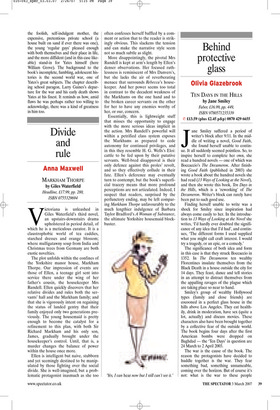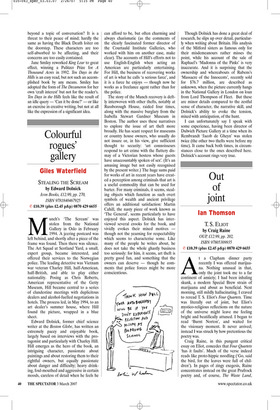Behind protective glass
Olivia Glazebrook
TEN DAYS IN THE HILLS by Jane Smiley Faber, £16.99, pp. 449, ISBN 9780571235339 ✆ £13.59 (plus £2.45 p&p) 0870 429 6655 Jane Smiley suffered a period of writer’s block after 9/11. In the middle of writing a novel, Good Faith, she found herself unable to continue. It all suddenly seemed pointless. So, to inspire herself to complete her own, she read a hundred novels — one of which was Boccaccio’s The Decameron. After finishing Good Faith (published in 2003) she wrote a book about the hundred novels she had read (13 Ways of Looking at the Novel), and then she wrote this book, Ten Days in the Hills, which is a ‘reworking’ of The Decameron. Writer’s block can rarely have been put to such good use.
Finding herself unable to write was a shock for Smiley since inspiration had always come easily to her. In the introduction to 13 Ways of Looking at the Novel she writes, ‘I’d hardly ever doubted the significance of any idea that I’d had’, and continues, ‘The different forms I used supplied what you might call craft interest. I would try a tragedy, or an epic, or a comedy.’ The significance of both idea and form in this case is that they struck Boccaccio in 1352. In The Decameron ten wealthy Florentines insulate themselves from the Black Death in a house outside the city for 14 days. They feast, dance and tell stories in an attempt to distract themselves from the appalling ravages of the plague which are taking place so near to hand.
Smiley’s group of wealthy Hollywood types (family and close friends) are cocooned in a perfect glass house in the hills above Los Angeles. They eat healthily, drink in moderation, have sex (quite a lot, actually) and discuss movies. These characters also have been brought together by a collective fear of the outside world. The book begins four days after the first American bombs were dropped on Baghdad — the ‘Ten Days’ in question are 24 March to 2 April 2003.
The war is the cause of the book. The reason the protagonists have decided to huddle together is the war. They fear something bad, something unnameable, coming over the horizon. But of course it’s not: what is the war to these people beyond a topic of conversation? It is a threat to their peace of mind; hardly the same as having the Black Death loiter on the doorstep. These characters are too self-absorbed to be affecting, and their concerns are too easily contained.
Jane Smiley reworked King Lear to great effect, winning a Pulitzer Prize for A Thousand Acres in 1992. Ten Days in the Hills is an easy read, but not such an accomplished book by any means. Smiley has adopted the form of The Decameron for her own ‘craft interest’ but not for the reader’s. Ten Days in the Hills feels like the result of an idle query — ‘Can it be done?’ — or like an exercise in creative writing, but not at all like the expression of a significant idea.











































































 Previous page
Previous page